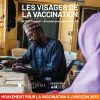Writing
-
Against chocolate-covered broccoli: text-based alternatives to expensive multimedia content
The great multimedia content deception Learning teams spend millions on dressing up content with multimedia. The premise is always the same: better graphics equal better learning. The evidence tells a different story. The focus on the presentation and transmission of content represents a fundamental misunderstanding of how learning actually works in our complex world. Multimedia…
Written by

-
The great technical assistance disruption: How peer networks outperform experts at a fraction of the cost
“If health workers do not share their challenges and solutions, we are bound to fail.” This declaration from a participant in the Teach to Reach initiative facilitated by The Geneva Learning Foundation (TGLF) cuts to the heart of a crisis that has long plagued global health technical assistance: the persistent gap between what external experts provide…
Written by

-
Semaine mondiale de la vaccination: Que voyez-vous?
English version | Version française Ceci est la préface de la nouvelle publication Les visages de la vaccination. En savoir plus… Télécharger la collection… Chaque jour, des milliers d’agents de santé, de l’Afghanistan au Zimbabwe, se lèvent et se rendent au travail avec un seul objectif en tête : faire en sorte que les vaccins parviennent…
Written by

-
Five examples of double-loop learning in global health
Read this first: What is double-loop learning in global health? Example 1: Addressing low uptake of a vaccine program Single–Loop Learning: Improve logistics and supply chain management to ensure consistent vaccine availability at clinics. Double–Loop Learning: Engage with community leaders to understand cultural beliefs and concerns around vaccination, and co-design a more localized and trustworthy…
Written by

-
Learning from Frontline Health Workers in the Climate Change Era
By Julie Jacobson, Alan Brooks, Charlotte Mbuh, and Reda Sadki The escalating threats of climate change cast long shadows over global health, including increases in disease epidemics, profound impacts on mental health, disruptions to health infrastructure, and alterations in the severity and geographical distribution of diseases. Mitigating the impact of such shadows on communities will…
Written by

-
Digital challenge-based learning in the COVID-19 Peer Hub
A digital human knowledge and action network of health workers: Challenging established notions of learning in global health When Prof Rupert Wegerif introduced DEFI in his blog post, he argued that recent technologies will transform the notions and practice of education. The Geneva Learning Foundation (TGLF) is demonstrating this concept in the field of global health, specifically immunization,…
Written by
-
Defunking Grunter
Part 1: The Journey Begins Suspended in the swirling galaxies beyond our own, the celestial stage of the Cat’s Eye Nebula shimmered. The nebula was a kaleidoscope of iridescent gases, dazzling cosmic dust, and radiant energy, an ideal sanctuary for the Astral Scholars. Their gathering place, the Obsidian Forum, was a levitating, jet-black platform, as…
Written by

-
The Shadow on the Rowan
Part I: The False Spring The Great Hall of the Keep smelled of beeswax, venison, and the damp, ancient stone of the Highlands. It was a place of rigid lines and heavy tapestries, a stark contrast to the wind-scoured, chaotic beauty of the Ring of Brodgar where Colum mac Eòghain made his home. Colum stood…
Written by

-
Listen to the Ninth Dialogue for Learning, Leadership, and Impact
The Geneva Learning foundation’s Dialogue connects a diverse group of learning leaders from all over the world who are tackling complex learning, leadership, and impact challenges. We explore the significance of leadership for the future of our societies, explore lessons learned and successes, and problem-solve real-world challenges and dilemmas submitted by Contributors of the Dialogue.…
Written by

-
Listen to the Eighth Dialogue for Learning and Leadership
Discover the leadership journeys of two remarkable learning leaders Every episode is different, drawing on the life experiences of Key Contributors and of listeners. As a listener, you can become a Contributor by sharing your own learning and leadership challenge – and what you are doing about it. Share your challenge… In the Eighth Dialogue, Karen E. Watkins…
Written by
